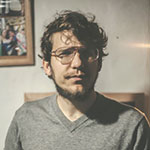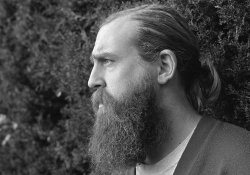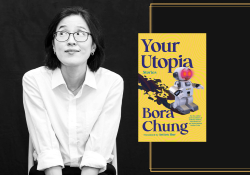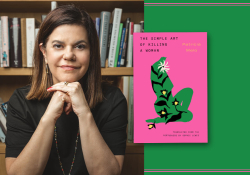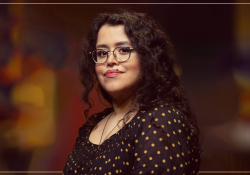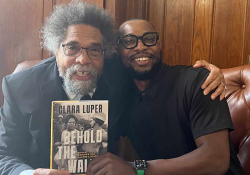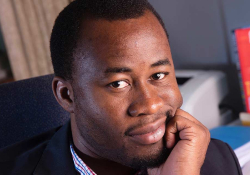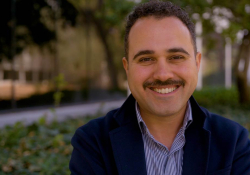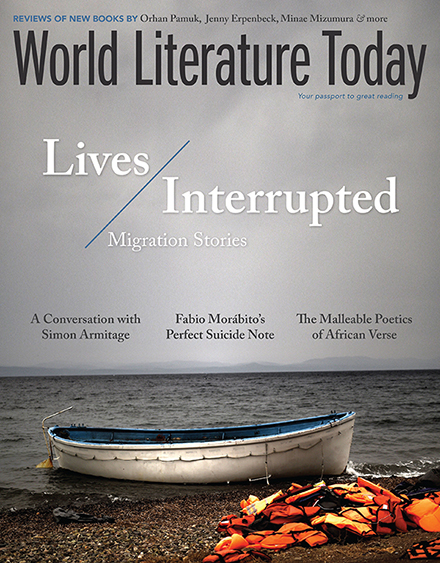Literature as Delayed Dialogue: A Conversation with Kike
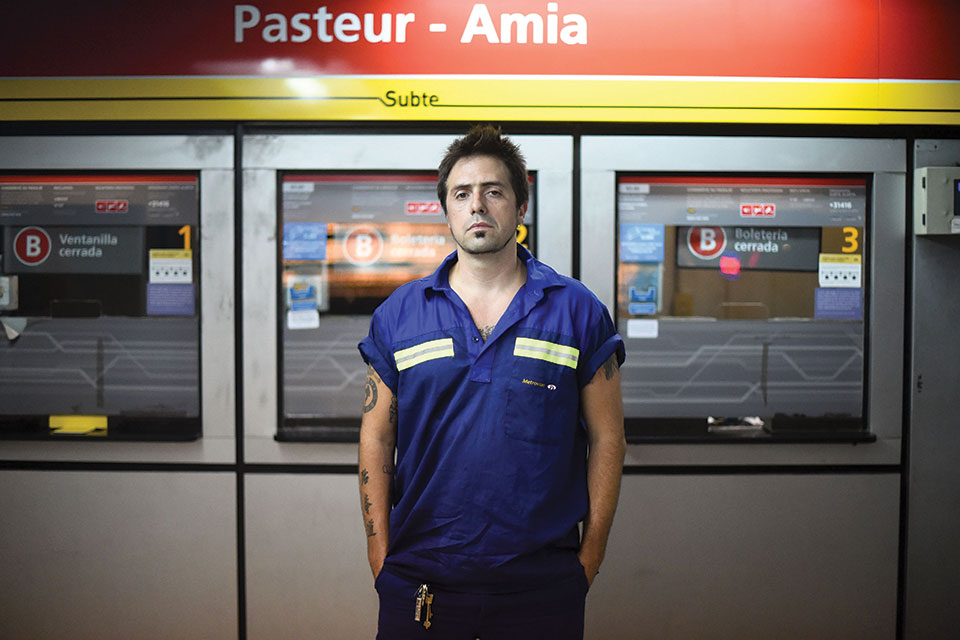
The Argentine author Enrique Ferrari, known in Buenos Aires as Kike (kee-Kay), has become more visible in the past two years. He writes by day, works cleaning the subway at night, and revises his work during breaks. A family man, father of three, martial arts aficionado, and longtime acolyte of Charles Bukowski, Karl Marx, and North American crime writers, he is mostly known for his crime fiction and his rise as an autodidact laborer. Though skeptical, he uses his newfound platform to discuss his work and his views on literature. I was able to sit down with him at his home to talk about his works in progress, literatures of interest and influence, his relentless use of the epigraph, his self-perception and the public’s perception of him as a writer, and the separation of his day—or night—job, which seems very distinct from his trade as a writer.
Paul Holzman: I believe it was in an interview with Crónica TV where they asked you if today you would rather be Coelho or Bukowski. You refrained from selecting either one but did note you would not want to be another Coelho. You also mentioned that you do not want to be simply read but rather be in dialogue with your readers.
Kike: Literature is a delayed dialogue. It is like correspondence before the Internet—an old letter. You write today and around ten days later it arrives on the other side of the world to a friend who reads it. It takes a week for them to answer you, and twenty days later the letter arrives, responding to something that is not happening to you anymore. Literature functions a bit like this. What I want to say, to find the clearest example for both of us, is this: I wrote Operación Bukowski (Operation Bukowski) living in the United States in 2002. It was published in 2004. And you, being an American, read that novel this year in Argentina. That is a delayed dialogue. The text traveled 10,000 kilometers there, then 10,000 kilometers here, and returned to travel around over there. Moreover, you read it in a language that is not yours twelve or thirteen years after it was written.
Holzman: Not to mention that the novel begins in a neighborhood that I know better than Los Angeles itself—Almagro.
Kike: And I’ve never been to Los Angeles. So, you probably complete a part of the text that I could not complete because I am unaware of all of that. There is one more thing I’d like to mention in respect to this matter. Bukowski is a writer who has been fundamental to my initiation as a writer and my early formation. I mean, I even have him tattooed right here [points to his arm].
It seems unthinkable for me to imagine the best authors of our country without Faulkner, McCullers, Chandler, Hammett, and the gang of crime and detective fiction.
But in a way, I tried to pay a general homage to North American literature. It is a very important literature for me and, to my understanding, for the rest of Argentine writers from the mid-nineteenth century until today. It seems unthinkable for me to imagine the best authors of our country without Faulkner, McCullers, Chandler, Hammett, and the gang of crime and detective fiction. And the same goes for other authors who also interested me greatly. Without Mailer, without Auster, Cheever, Salinger. It is very difficult to think about Argentine literature, it seems to me, without listening to the North American literature of the twentieth century.
Holzman: Speaking of Bukowski, what enchants me about Bukowski is what really drew my attention to what you do. You are a very popular person, in the sense that, you are well informed and committed to your civil responsibilities. You are an activist in your city, aware of what is happening to the average person. You also write for Metrodelegados (Metrodelegates). I believe Bukowski was also a popular writer in this sense, working in the postal service until he was fifty. So, in regard to the things that influence us in the popular world and your being an activist, how do you find the balance between the “low culture,” if you will, that one resists, and the popular that is necessary?
Kike: The thing that I believe is most important, above all, or that will define the text, is its quality. That is the task more or less.
Hemingway had a tremendous literary quality and was profoundly popular. I say profoundly popular because he was a writer of the people, but also his literature was popular. Coelho’s writing has no quality, but a lot of people buy it. Now if someone comes and says exactly the contrary, that is very difficult to refute! So, the first measure is a measurement of quality that has to do with each individual’s subjectivity. To me it seems pretty easy to read Hemingway and realize that he writes really well, and that the latter writes poorly. But furthermore, taking a concept from Hemingway, honesty is fundamental.
Those born in an average environment are popular. They are not products of the university and the library. I read, but I also went out to play football and got into fistfights with the boys from the neighborhood, and I like metal music. I don’t like Debussy; I like Motörhead. So then, I could opt to project my voice into a character that smokes a pipe and listens to Debussy and doesn’t work, and I could put out a chessboard for our interview while I pet my cat. But I am not that person.
Holzman: So it has to do with transparency.
Kike: No. In reality I think it has to do with honesty. The importance of literature is that I write the best I can and that my tools are good, to work the story, to work the words, to work the language. And later, what those words are going to say is what you have. If you are a person who watches TV shows and likes karate, that is going to translate into your work. In my case, I write for my union’s magazine, and like you say, I am a political activist. I am a person with deep political convictions, which I express everywhere. So that too is in my literature. But it is obvious that it is going to be there because that is part of who I am. And everything that I am comes out in my literature whether I want it to be there or not.
Holzman: Sometimes I find that an author is trying to preach to, or convince, the reader. Another aspect that draws me to your writing is although being such a political activist and involved in your union, you don’t proselytize the reader. Obviously, there are things that a reader will encounter and say, Ah, he must be a Marxist. But I don’t know if you are. [Kike points to a tattoo of Karl Marx on his shoulder and laughs.] Well, with a tattoo of Marx . . . [Laughs.]
But what I am saying is that it doesn’t compel me to toss aside your book.
Kike: I took this from the Spanish-Mexican writer Paco Ignacio Taibo II, a very great writer and a tremendous historian. He says a fabulous thing, “Of course we have ideas, and these ideas are going to translate to what we write and so on. But we have to exclude our pamphleteering, our propaganda.” Pamphleteering is contrary to literature. Because it seeks to be didactic, and it is saying what we have to do, it is telling us where we need to go. I tell a story, and after that, I try to interfere with the reader the least I can.
In Que de lejos parecen moscas (From afar they look like flies), the first line was originally, “A man is someone who gives a damn about what others think or feel.” And, of course, that was the first thing that I had to take out, because I do not have to tell the reader if the man is a good guy or a bad guy. I have to tell the reader what the man does. Yes, the man does seem despicable to me. And of course I tell it in a way where it is clear that he is a despicable person. Now, it could be that to you he doesn’t seem despicable. There are some people who say that at some point what happened to Mr. Machi generated empathy and inspired pity toward him. That is very odd. I had hoped that he wouldn’t inspire pity in anyone. But that is not my business.
Holzman: In Que de lejos parcen moscas, there are epigraphs by Rodolfo Walsh, Karl Marx, David Goodis, and Jim Thompson.
Kike: Epigraphs serve two roles in my literature. One is to express out loud the writers I enjoy a lot. If it is just a phrase that fits perfectly for a story and it is a writer that does not interest me, I don’t use it. I use the epigraphs to say that these authors are my forebears. I put them in their original language even if I do not understand it. I look for the translation, and then put a little piece of it in the original because to me it is interesting to put the words they chose and not others. It is a bit snobbish. Second, I use them to provide a guide to the story that I am telling. Que de lejos parecen moscas is a crime novel, a police novel. But it is a certain class of crime novel, and that is what Jim Thompson and David Goodis represent. So from the beginning I clarify the idea that should be key in the novel.
The novel that I am writing now has three epigraphs; one from Paco Ignacio Taibo II, one from Trotsky, and one from Philip K. Dick. I want the idea of the novel to come from this juncture. So I say to the reader, “Look, while I was writing this novel, I was thinking about this. You can think about what you want, but I was thinking about this.”
Holzman: Your novel Lo que no fue (What was not) received a mention by Casa de las Américas yet was not published in Buenos Aires. Will the book ever be published in Buenos Aires?
Kike: I believe so.
Holzman: Is it more difficult to publish in Argentina?
Kike: For me it turns out to be easier to publish outside of Argentina.
Holzman: I’ve noticed that. You were first published in Madrid, then Paris, and after that Buenos Aires.
Kike: My first publications were a coincidence and the dice fell well. So I started taking writing more seriously in 2010 and 2011. From that time on, it was easier to publish in Argentina. My real career as an author began in 2010. So the novel that I am writing now, I am sure it will end up getting published here once I finish it. But the books I have already published in other countries are going to be more difficult to publish here in Argentina, and even more so if they aren’t crime novels. A novel like Lo que no fue, about the civil war in Spain in 1937, is not a novel that would be easy to publish here.
Holzman: You said, “My work is distant from my trade.”
Kike: Writing is my trade. My work is circumstantial. That is the first difference. My trade has always been the same. For more than twenty years I have dedicated time to writing, and in those twenty years I have changed jobs fifteen times. So there is the first difference in consistency and perseverance. Because from the beginning I did not care about my job, my jobs do not matter to me, whereas my trade does. And now, the work I am doing today requires a very physical preponderance that does not take much thought. Every day is the same work. It is done with others and is very different from my trade, which is different every time I sit down to write. The most physical effort it takes is to sit still, and that is principally done alone. So in this sense, it seems to me that, yeah, unless the moment comes where I dedicate myself solely to writing and am able to live off my writing, the trade I have chosen and the jobs I have will each move along, separate from each other.
Holzman: And when you write for the Metrodelegados newspaper, do you separate that from what you do here writing in your chair at home?
Kike: Yes. It is another thing—including the articles that they ask me to write. I wrote an article when Lemmy Kilmister of Motörhead died; I wrote a piece on Ricardo Piglia and his sickness. When I write crónicas and articles for La Granada, they are closer to literature; but the rest are different. And when I write for the union’s magazine it is the same. They have more to do with a set task. In fact, I write them and send them to be edited without looking them over again. They are actions and thus another thing. My literature is much more persnickety.
Holzman: And with the literature you write, is it more difficult to let it go?
Kike: Yes, of course. Once I sent a story to be published for the first time and the editor told me what she thought was not right about the ending and I changed it twice, and in the last edition I changed it again. And in the end it was never finished. But in general, once it is finished, it’s finished. However, I edit my texts quite a bit. I have a few friends, like Juan Mattio and Raquel Robles, that when I am just about to finish a text, I give it to them and they revise it. And then they give me their opinion, and I generally use this as editing. It is a space with good readers and writers whose style of writing interests me, and they give me some guidelines. So I correct it and polish it there. And once it has passed through that filter, the text is finished and it is odd if someone finds something else.
Holzman: Who are some of the authors you are reading now?
Kike: Raquel Robles has a delicious novel called Pequeños combatientes (Tiny soldiers), and she has a few other books as well. Right now she is working on a novel that isn’t published yet, but I had the luck of reading it, and it is marvelous.
Holzman: Do you read much while you are writing?
Kike: It depends on the moment. It has a lot to do with the books that fall into my hands. I have three or four books that I have started but still have yet to finish one of them. I have a small reading plan that I’d like to follow. It has to do with not interfering with what I am writing right now, which is a problem sometimes. Whenever I finish my novel I will read the second tome of Ricardo Piglia’s very interesting personal journal, and I will discuss that with Juan. There is a novel by an Argentine writer, Marcelo Luján, who lives in Spain, called Subsuelo (Underground). I acquired a book recently that I want to read, which is Nabokov’s classes on European literature. But that is a book with a one-year plan because the idea that I have is to take the classes. So, for example, if I read the chapter on Kafka’s Metamorphosis, the idea is to read Metamorphosis with Nabokov’s indications on how to read Metamorphosis.
Holzman: You mentioned Piglia again. So I want to go back to your short story “Blanco Artificial.” You use a fragment of Piglia citing Antón Chekhov: “The classic form of the short story is condensed within the nucleus of that future, unwritten story.”
Kike: Well, Piglia has a text called the “Theses on the Short Story.” There is an anecdote. It is a guy who goes to a casino and makes a lot of money and commits suicide. It is the unwritten anecdote of Anton Chekhov. This anecdote contains the entire account of the modern short story. And “Blanco Artificial” is an homage to Ricardo Piglia. I sent it to him before publishing it, asking for his permission to publish it because at that time Target in the Night was Piglia’s latest novel and Artificial Respiration is Piglia’s first novel. So what I did was rewrite this possibility. It is an anecdote that provides thousands of options. He commits suicide because the police were chasing after him, he commits suicide because at the same time he finds out his son died, he kills himself because he can’t handle anything. There are a thousand options, and I selected one. It is full of references to Piglia and this anecdote of Chekhov. The thief that goes to the casino is sprawled out on his bed at home reading books at one point. The manuscript is Money to Burn by Piglia. It is my short story that pays homage to an Argentine writer, who is and has been essential to my formation and my way of thinking about literature these past years. And I was lucky that he liked it.
Holzman: Yes. Because he replied to you, right?
Kike: Yes, I was fortunate enough that each time I wrote him he responded quickly.
Holzman: So what does 2017 look like for you? Science fiction?
Kike: This year the Mexican edition of Lo que no fue will be published, which will take me away from talking about crime fiction for a bit and to talking about politics since it is a political novel. And it would be great if that happened since it would come out right when I am writing a novel that is not a crime novel, coming out at a time when that is all I am talking about. Curiously enough, the novel takes place in Mexico. So probably the first draft will be finished in the city in which it takes place, in its theater of war. The working title is El tipo en el cuarto pequeño (The man in the small room), in reference to The Man in the High Castle, by Philip K. Dick. And the rest of the year I would like to dedicate my time to another novel that I have started which is a bit lighter. It is an adventure novel that pays homage to the martial arts films that I enjoyed when I was young. It is a project more about enjoyment than literary commitment. After that, we will have to see.
December 2016
Editorial note: For more, read Kike’s “A Good Prisoner’s Handbook.”
